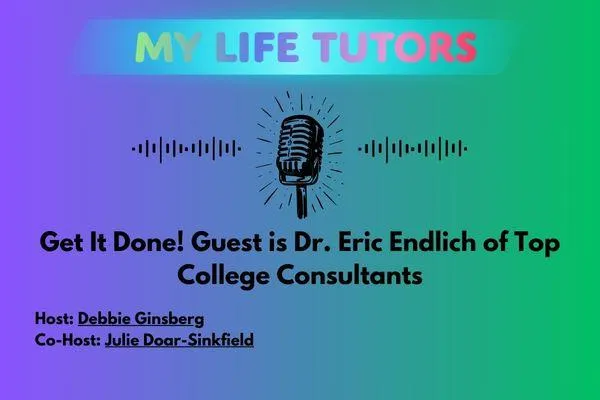My Life Tutors Blog
Learn more about our Life Tutoring services
and the motivations behind our work
My Life Tutors Blog
Learn more about our Life Tutoring services and the motivations behind our work

Episode 9: Get It Done! Guest is Dr. Eric Endlich of Top College Consultants
Navigating College for Neurodivergent Students: A Conversation with Dr. Eric Endlich
Introduction: Welcome to a insightful discussion on episode 9 of "Get It Done for the Neurodivergent Individual." In this episode, Debbie Ginsberg from Organized4Life and Julie Doar-Sinkfield from My Life Tutors engage in a conversation with Dr. Eric Endlich, a PhD Clinical Psychologist and founder of Top College Consultants. Dr. Endlich specializes in assisting students with learning differences and emotional challenges in applying to college. The dialogue delves into the nuances of preparing neurodivergent individuals for the unique challenges of college life.
Key Takeaways:
Beyond Surface Preparations:
Drawing parallels between college preparation and parenthood, the speakers emphasize the need for readiness that goes beyond surface-level preparations. Being a college student involves managing time, self-care, and long-term planning.
Shifting from High School to College:
The transition from high school to college involves a shift from a structured environment with oversight to a more autonomous setting. Dr. Endlich highlights the importance of self-discipline in managing various aspects, including sleep, substance use, exercise, healthy eating, hygiene, and staying on top of assignments.
Identity and Connection:
Colleges are witnessing a growing trend where students take the initiative to create clubs and communities focused on disabilities, including neurodiversity clubs. This emphasizes the need for an identity aspect beyond traditional accommodations, leading to the establishment of Disability Cultural Centers on some campuses.
Making Friends in College:
Addressing concerns about making friends, Dr. Endlich notes that neurodiversity clubs and autism support programs often provide a social component, fostering connections among students. Making friends is a common concern for neurodivergent students, and these initiatives aim to create spaces for social interaction.
Database of Neurodiversity-Friendly Universities:
Dr. Endlich maintains a database of colleges with formal support programs for neurodivergent students. While acknowledging the existence of supportive environments in colleges not on the list, he emphasizes the importance of engaging with disability services offices during college tours to assess their effectiveness.
Challenges in Online College Courses:
Online college courses present unique challenges, with a potential conflict of interest as they often function as revenue-generating entities. The discussion touches on the need for national regulations to ensure that online colleges adhere to the standards set by the Disability Act.
The Role of Emotional Regulation:
The speakers discuss the critical role of emotional and mental readiness for college. Dr. Endlich highlights the importance of self-awareness and self-advocacy, encouraging students to identify their vulnerabilities and seek appropriate resources for emotional regulation.
Executive Function Age Discrepancy:
Dr. Endlich emphasizes the challenge of the gap between chronological age and executive function age, especially for neurodivergent individuals. This discrepancy highlights the importance of executive function coaching and the potential benefits of taking a gap year for better preparedness.
Collaborative Coaching Services:
Julie Doar-Sinkfield shares insights into her coaching services, focusing on operationalizing students' lives by addressing executive function skills. The proactive and collaborative approach aims to guide students through transitions, ensuring they develop crucial skills for success.
Encouraging Self-Advocacy:
Students are encouraged to fill out their own disability services paperwork to enhance self-awareness and understand their challenges. The importance of standing up for accommodations and taking the initiative in self-advocacy is highlighted.
Conclusion: As the conversation unfolds, it becomes evident that the journey through college for neurodivergent students is multifaceted. From self-awareness to emotional regulation and executive function skills, the discussion underscores the need for a comprehensive approach to ensure a supportive and thriving college experience for neurodivergent individuals.
. . . Take the First Step . . .
Ready to Transform Your Life?
Reach Out and Let's Chat!

Hours of Operation:
M-F 10 am - 5pm EST/1PM - 8PM PST
Rockfield Road
Windsor Mill, MD 21244
Serving the Continental United States